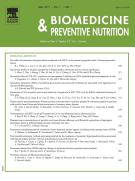Evaluation of biochemical interaction and correlation between high fluoride ingestion and protein metabolism - 15/06/13
 , Shashi Aggarwal
, Shashi AggarwalAbstract |
Excessive intake of fluoride results in dental and skeletal fluorosis, afflicting millions of people worldwide. Fluoride, under certain conditions, can affect virtually every phase of human metabolism. The aim of the study was to investigate the biochemical correlation between high fluoride ingestion and protein metabolism in fluorotic patients exposed to 5.9 to 24.5mg fluoride/L. Study group consisted of 705 patients in the age group between 20 and 60years (mean age of 39.35±11.27). The levels of total proteins, albumins and globulins were determined in serum by using kit assay method. Biochemical data was analyzed by one-way analysis of variance (ANOVA) with post hoc Tukey-Kramer and Bonferroni multiple comparison tests. The relationship between fluoride and serum proteins was calculated by Pearson's correlation and linear regression analysis. The results showed significantly (P<0.001) higher concentration of serum fluoride in fluorotic patients in comparison to control. The concentration of total protein, albumin, and globulin was significantly (P<0.001) decreased. Pearson's correlation and linear regression analysis proved the strong negative correlation of water and serum fluoride with total protein (r=−0.98, P<0.01), albumin (r=−0.63, P<0.01), and globulin (r=−0.58, P<0.01) in fluorotic patients.
Conclusions |
Excessive intake of fluoride aggravates protein deficiency in fluorotic population.
Le texte complet de cet article est disponible en PDF.Keywords : Fluoride, Total proteins, Albumin, Globulin
Plan
Vol 3 - N° 2
P. 129-137 - avril 2013 Retour au numéroBienvenue sur EM-consulte, la référence des professionnels de santé.
L’accès au texte intégral de cet article nécessite un abonnement.
Déjà abonné à cette revue ?

